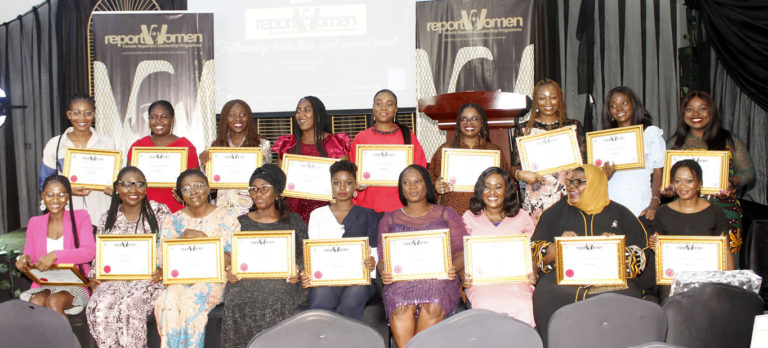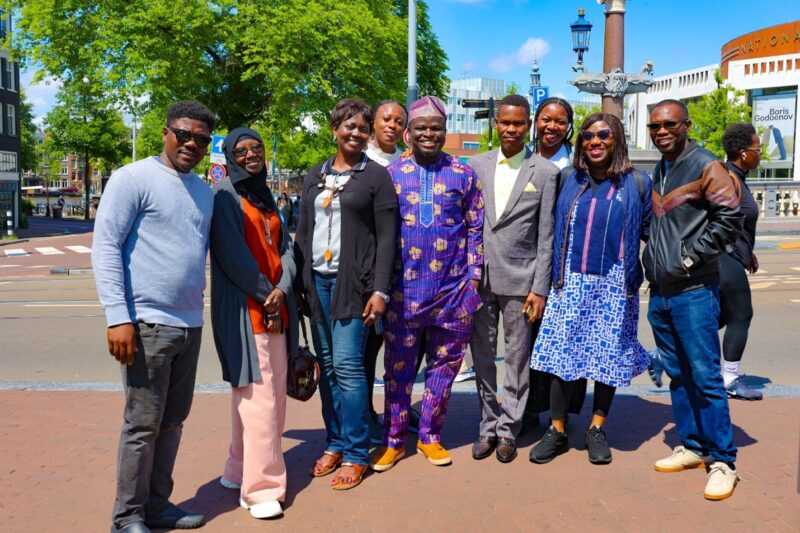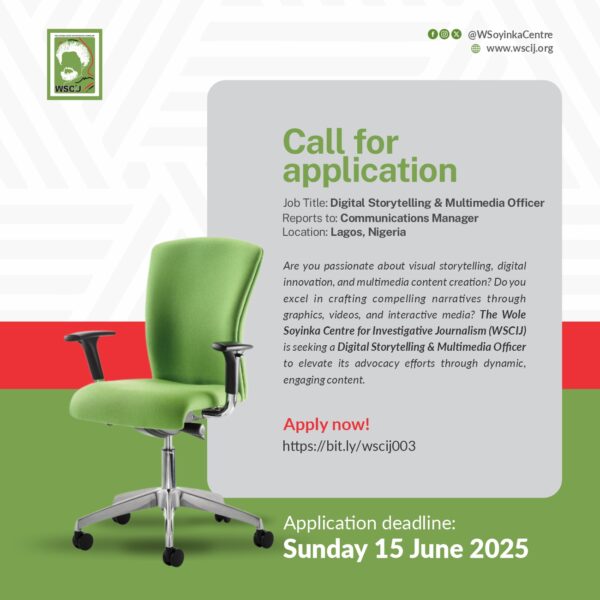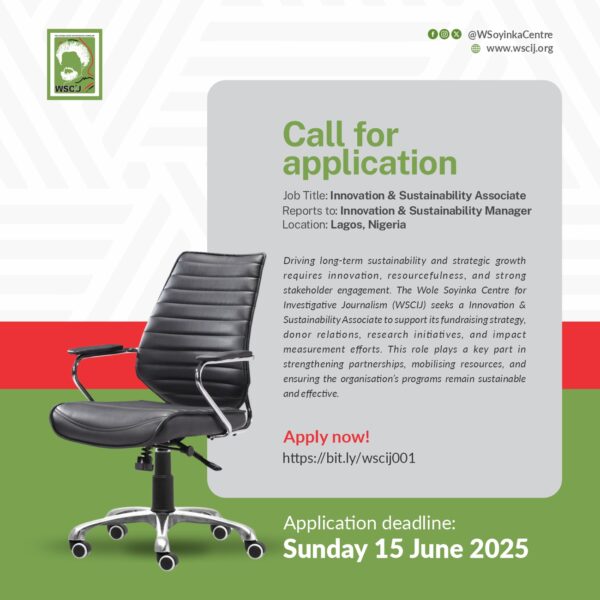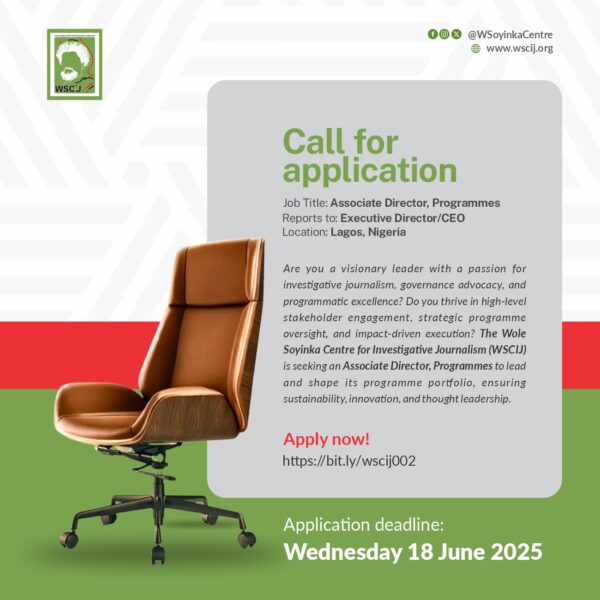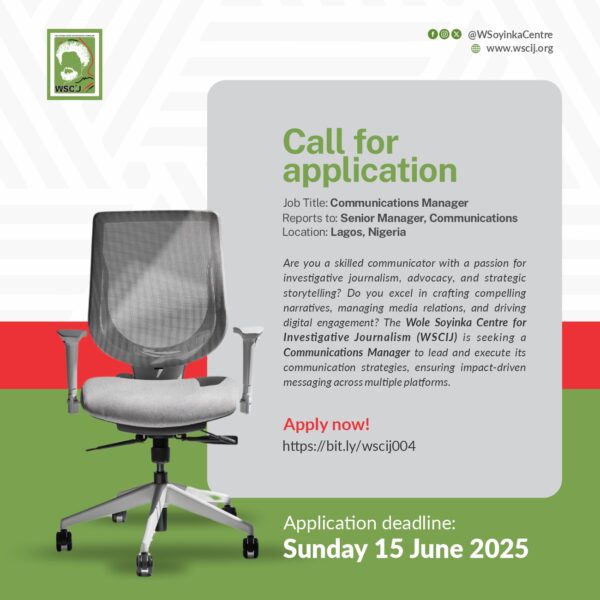21 female reporters across media organisations in Nigeria were inducted as fellows of the Report Women! Female Reporters Leadership Programme (FRLP) fellowship of the Wole Soyinka Centre for Investigative Journalism (WSCIJ) on Thursday 9 June 2022 in Lagos.
The 21 reporters were inducted after they participated in months of rigorous training and mentorship, and implemented story and leadership projects, under the 2021 Report Women! FRLP fellowship which focused on Sexual and Gender Based Violence (SGBV) with support from the Open Society Initiative for West Africa (OSIWA), now Open Society Foundation Africa.
Five of the female reporters were given special recognition for their outstanding leadership and story projects. The reporters are Anita Eboigbe, Managing Editor with HumAngle; Titilope Fadare, Senior Reporter with Premium Times; Bassey Ikpang, Assistant News Manager with the Nigerian Television Authority (NTA) Abuja, Kimberly Nwachukwu, Broadcaster with Nigeria Info FM, 95.1 Abuja; and Ann Godwin, River State Correspondent, The Guardian.
Anita Eboigbe was commended for both her story and leadership projects, which earned her a laptop and plaque. Titilope Fadare emerged runner-up in the story project category while Bassey Ikpang emerged runner-up in the leadership project category. They got a laptop, a cash prize of N50,000 and a plaque each. Kimberly Nwachukwu and Ann Godwin clinched the first prizes for the story and leadership project categories respectively. Both went home with a laptop, a cash prize of N100,000 and a plaque.
The representative of the funding partner, Paul Adeyeye, Programme Coordinator with OSIWA, stated that their support to WSCIJ was to address the dearth of women in top leadership positions in newsrooms across Nigeria. His words: “The project did not only advocate the inclusion of female voices, but it was also strategic in addressing the fundamentals that would make women as competitive as their male counterparts. At incubation, the project seemed ambitious, yet the leadership of WSCIJ has actualised this ambition and has shown the dynamic power and potential of female leadership.”
Motunrayo Alaka, Executive Director, WSCIJ, noted that FRLP and its fellowship sought to amplify that Sexual and Gender-Based Violence (SGBV) was terrible, and the media must refuse attempts to normalise the absurdity. She said the newly inducted 21 female reporters join the initial 53 fellows to make 74 fellows since the inception of the fellowship in 2017 and the Report Women programme since 2014, who addressed the complex ramifications of SGBV on one hand, and state unequivocally, that SGBV was not passable by any standard.
Public Relations Officer of Report Women Network (REWON), Abosede Omoruyi, while welcoming the 21 female reporters into the network, explained that the network’s mission was to advocate equitable reporting and female leadership in the media. According to her, “We are a company of women with great minds. A company of positive-thinking female journalists committed to the cause of better representation for women and girls in the media. This Fellowship sharpens your leadership skills. I am bold to say that all REWON members are women achievers in Nigerian journalism and beyond.”
The event, moderated by Deji Badmus, founder TV360, and renowned investigative reporter, was lit with the experiences shared by the fellows on the impacts their story and leadership projects made, and their career trajectory following the training and mentoring exposure. Kofoworola Belo-Osagie, formerly Head, Education Desk, The Nation, won the International Visitor Leadership Program award of the US Department of State because of all she learnt during the fellowship. Another fellow, Dooshima Abu, a multimedia journalist with BBC Pidgin, stated that she was graduating feeling confident and empowered. Aneta Felix, a broadcast journalist with BBC Africa, formerly with PlusTV Africa, disclosed that her leadership project helped her win a fully funded The Mastercard Foundation scholarship for a master’s degree in the US. Khadija Ishaq Bawas gained confidence and started a media organisation focused on women and girls’ issues – KAMED Media Hub.
On their part, mentors on the FRLP fellowship congratulated the fellows and urged them to share the lessons with others. Abigail Ogwezzy-Ndisika, Professor of Mass Communication, University of Lagos, one of the four mentors, congratulated the fellows on the great impacts they have made since they got on the fellowship in July 2021. Lekan Otufodunrin, Executive Director of Media Career Development Network, another mentor, charged the fellows to make it a responsibility to take their learnings from the fellowship to others who could not make it to the fellowship.
In his vote of thanks, Samson Ademola, Programme & Research Officer, WSCIJ, congratulated the newly inducted fellows on the milestone, noting that although the fellowship was long and rigorous, it is beginning to pay off. He thanked the guests who graced the occasion including, Toun Okewale Sonaiya, Chief Executive Officer at Women Radio; Kadaria Ahmed, Chief Executive Officer at Radio Now; Lekan Ogunbanwo, Managing Director/CEO, PlusTV Africa; Adesola Ayo-Aderele, former Editor, Punch Online; Funke Treasure-Durodola, former Assistant Director of Programmes, Lagos Operations, Federal Radio Corporation of Nigeria (FRCN); and Rotimi Sankore, Chief Editorial Coordinator, Special Projects, AIM Media Group, among others.
The Female Reporters Leadership Programme (FRLP) along with its fellowship was added to the Report Women! Programme in 2017 to address the poor representation of women to men in leadership in the news and newsrooms. The 2021 Fellowship which is the fourth in the series received 146 applications from five countries—Nigeria, and one each from Spain, Uganda, The Gambia and Kenya—and 21 applicants were selected.

